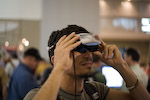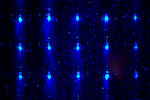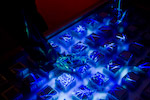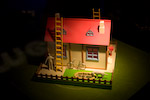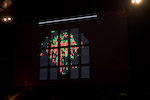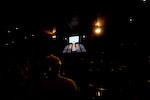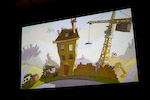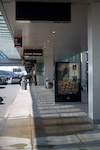First of all, I must apologise in advance to anyone living in Boston, or who has been to Boston and likes it. I had a reasonable time there, but in the end, I truly could not say that I like Boston. I found it chaotic, bland, the weather was awful, the airconditioning was as headache-inducingly undercooled as in every American City with 35+ degrees and high humidity outside, I felt unsafe in normal streets at times, the quality of the road workmanship was terrible, and the contrast between old and new and rich and poor was as shocking as ever. Many of these traits are shared by many other large American cities, so in essence my opinion about Boston ends up being mostly an opinion about the U.S.A. Furthermore, it does not seem to be a priority to fix any of these problems, which bothers me deeply.
The American society more or less has three functional levels, as far as I can tell. The top and smallest group consists of the power brokers, much less than 1% of the population. These are presidents, politicians, and some selected exceedingly wealthy people. These people call the shots and form the shape of society, without much meddling from other levels. The occasional elections don't really change much, other than sometimes switching the power from the ultra-conservative and somewhat fascist (in the original sense) Republicans to the quite conservative, and more egalitarian Democrats. These switchovers mostly make little difference, except that the Republicans are fairly ready to go to war in various places in the world, whereas the Democrats are more cautious and prefer less unilateral decision-making.
The next layer is fairly vast, and spans everything from very wealthy people to lower-middle class, but the layer is characterised by the belief that life is basically fair, and that people get what they deserve, and so they go about their life, and busy themselves with the pursuit of happiness, more or less successfully. These are the kinds of people who get angry if someone says that the U.S.A. is not everything it is cracked up to be. These people live in their neighbourhoods, shop in their preferred malls or streets, eat and drink, have affairs, and do everything that most Europeans would do, except that the food is on average much less healthy and the portions are insanely large, the people are less physically active, and they know relatively little about the rest of the world, and even about their own country. In tests, these are the kinds of people who, living in Boston, have only a small likelihoods of being able to point to California on a map, or even to the States on a world atlas. This is the backbone of America, and the voting public; see also group 1.
The last segment consists of people who in various ways fall through the cracks, or who choose to live outside the framework in which the previous group stays. This is the group which the previous group prefers to think doesn't exist, or if they are more enlightened, prefers to think is not that large. In fact it is probably as large as the previous group. These are people from poorer countries, or people from poor backgrounds, or people who for whatever societal reasons could never really piece together a proper existence, and includes at the top hamburger flippers at McDonalds who can barely afford their own life, get essentially no vacation, are not able to save up money, and whose lives would be ruined by a major illness, which would not be covered by healthcare, society or their jobs. At the bottom, we have drug dealers, criminals, and the half-crazy people who cannot really make any successful decisions or actions, and live on sidewalks, walking around mumbling to themselves. This is the underbelly of America, and the thing which no one likes to speak of, because no one can figure out how to fix it (without getting involved).
Every time I visit the States, I see more evidence of this third group. I have never in my life seen anyone from the first group. The second group, apple pie and fairy tale, is everywhere, except where they might have to acknowledge or confront the existence of the third group, or where they are not wanted by the first group.
Okay, having gotten that rant out of the way, here is a more detailed description of my trip. I arrived here for the Siggraph convention, the classes, the show and the people. The Siggraph crowd is different. Generally very friendly, open, and interested and interesting, it is a typical computer programming crowd, mixed with computer artists, and I enjoyed the company, if not necessarily the conference itself.
There was time here and there to look around a bit, and I took full advantage of that. Once we had dumped our bags in the hotel, I went for a walk around town to explore a bit. The first picture is of the square next to our hotel. Then I walked down to the river, crossed it, walked past MIT (where I could find none of the character I had expected), and along the river to the next major bridge, crossing back again.
I don't recall if it was the first evening or the second, but one night Martin-Karl and I walked down to get a drink before bedtime, yet we were stopped at the front door by someone who wanted to see our I.D., neatly not only refusing to anyone silly enough not to have it with them, but also anyone unfortunate or poorly organised enough not to have one. Anyway, I was silly and had left it at the hotel, so on the basis that I might be less than 21 (I was 40), I was refused entry. Needless to say, we never returned.
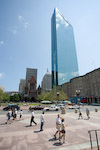
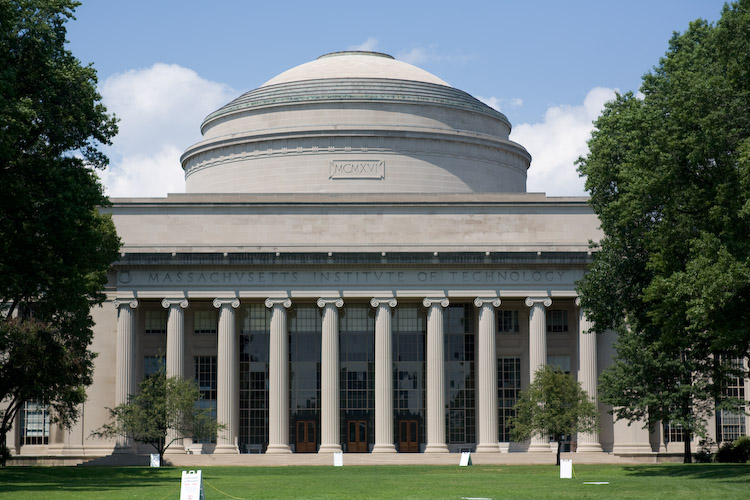

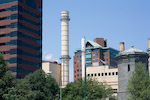
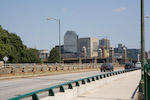
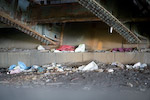




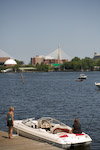
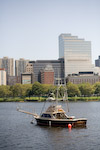
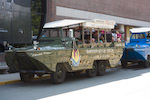

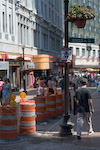
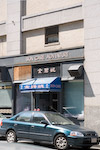
We also saw some American tourists lying down to be photographed for some unknown but funny reason, as well as some former gang members who were trying to get away from the ghetto through an organisation which had them show some really good breakdancing. Finally, some typical residents, shot from the hip.

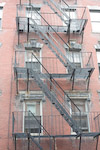
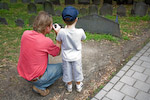
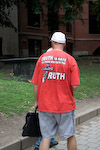


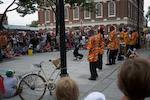
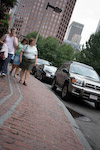
The rest of the conference was mostly uninteresting. I wanted to attend some of the better papers, and there weren't so many this time, but the mind-numbingly cold airconditioning more often than not drove me out of the auditoriums and into the warmer halls, where I roamed around. I doubt I will attend Siggraph again, at least not to catch the paper sessions, otherwise the most valuable part of the conference.
There are several problems with Siggraph, the airconditioning of which is merely the easiest to describe. First of all, the papers are chosen by a committee with deeply vested interests in who gets chosen, meaning that the same in-crowd is featured again and again. Secondly, the fair gets more noisy and less meaningful each year, and is at this point little more than a place for vendors to hawk their latest software, hardware, firmware and books. Nice, but hardly necessary. Finally, it is so bloody far away from most of the world that half the most important people and companies barely make it. This year I will attend RT07 instead, a much more focused event without the circus, and more fairly judged. It is also in Germany, so I won't have to worry about the insane consumption of gasoline and oil to pump cold-propelled headaches directly into the minds of the people who ought to be made comfortable. This last point has been an issue in every Siggraph I have attended, but seems to be getting worse.
